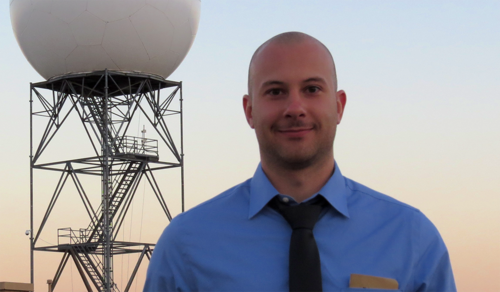
The University of Notre Dame’s Linked Experimental Ecosystem Facility (ND-LEEF) will host an event in its “Science at Sunset” series from 6:30 to 7:30 p.m. June 13 (Thursday). The event will take place at the Morrison Family Pavilion within St. Patrick’s County Park located on Laurel Road in South Bend and feature a presentation by Phil Stepanian, research assistant professor of civil and environmental engineering and earth sciences, titled, “Cloudy with a chance of migration: Using weather radar to track the incredible flights of birds, bats and bugs.”
“Monitoring flying animals that call the sky their home is a major challenge, but by using the continental radar network, researchers are able to see the dynamic habitat that is our national airspace via a bird's-eye view,” said Stepanian. “Attendees to this Science at Sunset event will have an opportunity to explore the skies with me and learn about the weather that drives wildlife activity in the air.”
ND-LEEF will provide snacks for the free program, and attendees are welcome to bring their own beverages, including beer and wine. Other alcoholic drinks and glass containers are prohibited; all beverages must be brought in plastic or metal containers. Although the County Parks and ND-LEEF partner on many science-related programs, the “Science at Sunset” series is distinctive in that it is designed for adults.
The program is free, but registration is required by calling the County Parks’ program reservation line by Monday (June 10) at 574-654-3155. To learn more, visit https://environmentalchange.nd.edu/news-events/events/2019/06/13/science-at-sunset/.
ND-LEEF is a globally unique research facility that is a resource of the Notre Dame Environmental Change Initiative (ND-ECI). At the University of Notre Dame, ND-ECI brings together more than 50 researchers across disciplines to help people and ecosystems adapt to climate change, mitigate the effects of land use change, predict species occurrences in a shifting world and improve water quality. The initiative works hand-in-hand with partners to support research that matters to society, answering the most critical environmental questions of our time. To learn more about ND-ECI, visit environmentalchange.nd.edu.
Contact: Brett Peters, ND-LEEF assistant director, Environmental Change Initiative, bpeters2@nd.edu, 574-367-7621; @NDLEEF
Originally published by at environmentalchange.nd.edu on June 4.